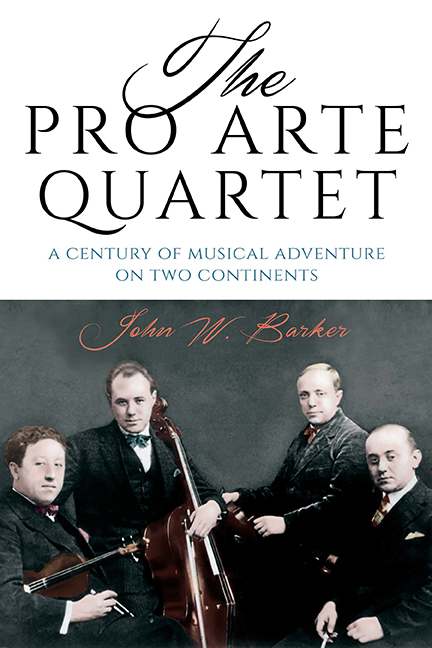Book contents
- Frontmatter
- Dedication
- Contents
- Preface
- Lists of Quartet Membership
- Introduction: Quartet Contexts
- 1 The Onnou Years, I (1912–31)
- 2 The Onnou Years, II (1932–40)
- 3 The Brosa Years (1940–44)
- 4 The Kolisch Years (1944–67)
- 5 The Paulu Years, I (1967–79)
- 6 The Paulu Years, II (1979–95)
- 7 The Perry Years (1995–Present)
- Conclusion: Retrospect and Prospects
- Appendixes
- Selected Bibliography
- Index A Composers
- Index B General
Conclusion: Retrospect and Prospects
Published online by Cambridge University Press: 10 June 2021
- Frontmatter
- Dedication
- Contents
- Preface
- Lists of Quartet Membership
- Introduction: Quartet Contexts
- 1 The Onnou Years, I (1912–31)
- 2 The Onnou Years, II (1932–40)
- 3 The Brosa Years (1940–44)
- 4 The Kolisch Years (1944–67)
- 5 The Paulu Years, I (1967–79)
- 6 The Paulu Years, II (1979–95)
- 7 The Perry Years (1995–Present)
- Conclusion: Retrospect and Prospects
- Appendixes
- Selected Bibliography
- Index A Composers
- Index B General
Summary
There is a famous Chinese saying, attributed to Confucius—as are all good Chinese sayings—to the effect: It is difficult to make predictions, especially with regard to the future (Or was that Yogi Berra?). So it is with the Pro Arte Quartet.
Though many string quartets have endured for decades, frequently with changes of personnel, only one has survived for a century. From their beginning to his demise, Alphonse Onnou was determined that the Quatuor Pro Arte should not die with him, but should find continuing life through their commitment to the University of Wisconsin in Madison. Despite recurrent changes in personnel and periodic crises, that commitment has been the anchor of survival.
Such survival is by no means ended. Our story is incomplete as of this writing, for the Pro Arte Quartet remains alive and active in Madison, still adding to their history. They maintain their decades-long pattern of giving concerts regularly, both in Madison and in tours around the state of Wisconsin. They continue to make appearances around the country. They continue to seek out new works by contemporary composers, and to do their share in championing the ongoing idiom of music for string quartet. Both in contemporary and in “mainstream” quartet literature, they diligently maintain the highest standards of ensemble skills and interpretative artistry.
It must be admitted that there are uncertainties as we look to the Pro Arte's future.
The quartet's livelihood and status are at the disposal of the University of Wisconsin. At this writing, there are shadows cast at both the national and state levels. The state of Wisconsin itself is in the midst of drastic political and fiscal change, involving heavy discrimination against educational institutions. The University of Wisconsin has been subjected to significant budget cuts, and there will be much upheaval in the years to come, involving sharp prioritizing of activities. The School of Music (now renamed the Mead Witter School of Music) faces its share of such budgetary constraints, whose full impact is only beginning to be understood. To be sure, the high standards and growing reputation of the School and of its faculty, especially in the field of training young performers, will certainly be sustained as fully as possible.
- Type
- Chapter
- Information
- The Pro Arte QuartetA Century of Musical Adventure on Two Continents, pp. 242 - 248Publisher: Boydell & BrewerPrint publication year: 2017

